英语省略句课件
高中英语省略句用法详解及练习
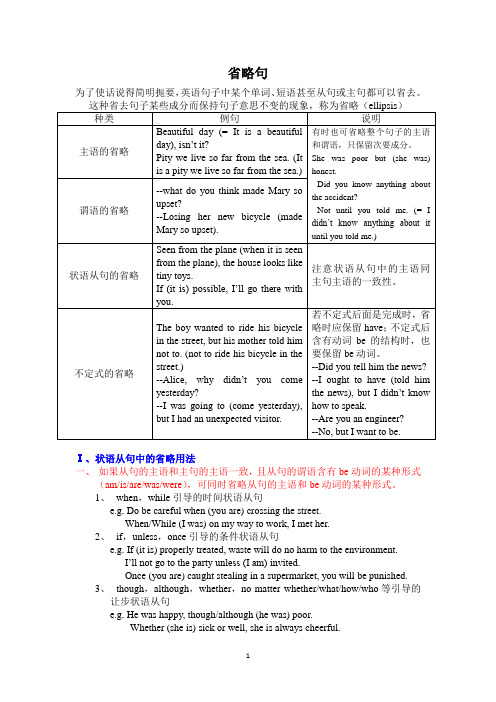
省略句为了使话说得简明扼要,英语句子中某个单词、短语甚至从句或主句都可以省去。
Ⅰ、状语从句中的省略用法一、如果从句的主语和主句的主语一致,且从句的谓语含有be动词的某种形式(am/is/are/was/were),可同时省略从句的主语和be动词的某种形式。
1、when,while引导的时间状语从句e.g. Do be careful when (you are) crossing the street.When/While (I was) on my way to work, I met her.2、if,unless,once引导的条件状语从句e.g. If (it is) properly treated, waste will do no harm to the environment.I’ll not go to the party unless (I am) invited.Once (you are) caught stealing in a supermarket, you will be punished.3、though,although,whether,no matter whether/what/how/who等引导的让步状语从句e.g. He was happy, though/although (he was) poor.Whether (she is) sick or well, she is always cheerful.No matter how/However hard the task (is), we must fulfill it in time.(注:从句的主语和主句的主语不一致时,只省略从句中的be动词形式)4、as if,as though引导的方式状语从句e.g. He rubbed his eyes and yawned as if/though (he was) waking up after along sleep.He stood up as if/though (he wanted) to leave.(as if/though + to do表示一个将来的动作)二、than,as引导的比较状语从句中的省略用法:当不同的主语进行比较时,一般省略从句中的谓语;当从句中的主语与谓语(be动词除外)和主句中的主语与谓语相同时,通常省略从句中的主语和谓语,只保留比较部分。
高中英语省略句
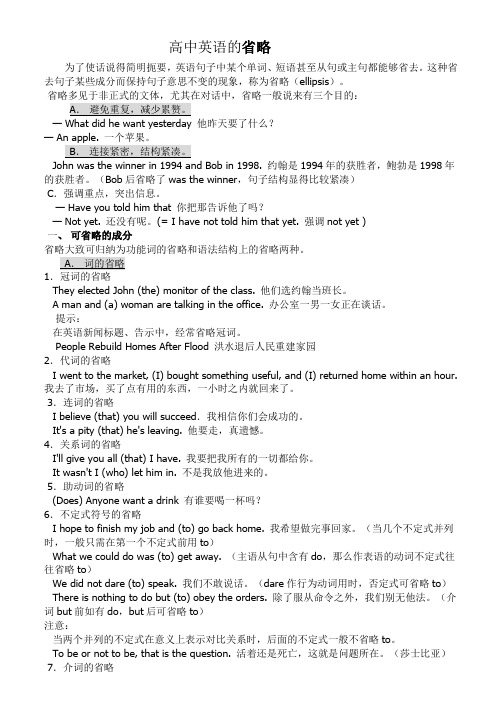
高中英语的省略为了使话说得简明扼要,英语句子中某个单词、短语甚至从句或主句都能够省去。
这种省去句子某些成分而保持句子意思不变的现象,称为省略(ellipsis)。
省略多见于非正式的文体,尤其在对话中,省略一般说来有三个目的:A.避免重复,减少累赘。
— What did he want yesterday 他昨天要了什么?— An apple. 一个苹果。
B.连接紧密,结构紧凑。
John was the winner in 1994 and Bob in 1998. 约翰是1994年的获胜者,鲍勃是1998年的获胜者。
(Bob后省略了was the winner,句子结构显得比较紧凑)C.强调重点,突出信息。
— Have you told him that 你把那告诉他了吗?— Not yet. 还没有呢。
(= I have not told him that yet. 强调not yet )一、可省略的成分省略大致可归纳为功能词的省略和语法结构上的省略两种。
A.词的省略1.冠词的省略They elected John (the) monitor of the class. 他们选约翰当班长。
A man and (a) woman are talking in the office. 办公室一男一女正在谈话。
提示:在英语新闻标题、告示中,经常省略冠词。
People Rebuild Homes After Flood 洪水退后人民重建家园2.代词的省略I went to the market, (I) bought something useful, and (I) returned home within an hour. 我去了市场,买了点有用的东西,一小时之内就回来了。
3.连词的省略I believe (that) you will succeed.我相信你们会成功的。
It's a pity (that) he's leaving. 他要走,真遗憾。
英语中的省略句

• The problem was a continuous worry to me until it was solved. • Until solved,the problem was a continuous worry to me.
• The young man was listening to music all the time while he was working at the computer.
英语中的省略句பைடு நூலகம்
• 在时间、让步、方式、条件等状语从句中,即由 when、while、although、unless、if、as if等引导 的从句中,如果从句的主语与主句主语一致,或 者主语是it,且在谓语动词中含有be时,常省略从 句的主语和be动词。 • Be careful when(you are)crossing the street.当你 过马路的时候要小心。 • He won’t go to the party unless(he is)invited.除 非收到邀请,否则他不会参加聚会。 •
• He opened his lips as if(he were)to speak.他张开 嘴好像有话说。
• After she learned some simple Chinese,the American girl was able to communicate with the other students in her class. • After learning some simple Chinese,the American girl was able to communicate with the other students in her class.
高中英语语法——省略句(26张PPT)

please.
的一部分)
A: Would you like to
come to the party? B: I’d love to (come the
party).
不定式后 省略动词
They do not visit their parents
as much as they ought to (visit
பைடு நூலகம்
— Well, her parents wouldn’t allow
her to go to the party, but she
still _____.
A. hopes to
B. hopes so
C. hopes not
D. hopes for
(江苏2017)
4. — Have you got any particular
You can borrow my first aid notes if you want to (borrow my first aid notes).
不定式后省略动词
7) Sounds like a good idea. (It) sounds like a good idea.
8) Anything I can do for you? (Is there) anything I can do for you?
5. Sorry to hear that. I’m sorry to hear that.
6. Pity you couldn’t come.
It’s/ What a pity you couldn’t come. 7. This way, please.
Step this way, please.
高中英语语法-省略句
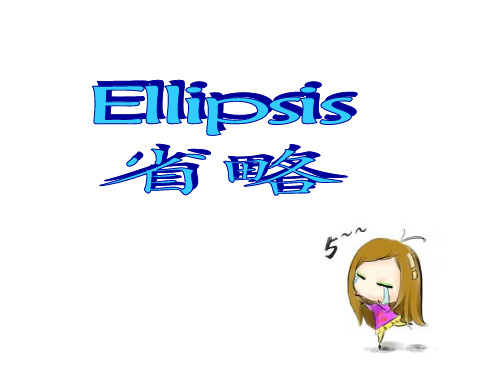
: Unlesshhee is invited, he won’t come.
: Unlesshe is invited, he won’t come. : Whilehhee is doing house work, my father often listens to music. : While he is doing house work, my father often listens to music.
2、省略主谓或主谓语的一部分。如:
(省略主语和谓语)
: What/How (do you think) about a cup of tea ? : Why (do you) not say hello to him ?
3、省略表语。
: –Are you thirsty? – Yes, I am(.thirsty). : His brother isn’t lazy, nor is his sister(.lazy).
※介词的省略※(考点)
1. 一些常和动名词、形容词一起搭配的介词常省 略,而保留其后的 动名词,常见的句型有
spend/waste time (in) doing, lose no time (in) doing; have difficult/trouble (in) doing; be busy (in) doing; stop/prevent sb. (from) doing 等。
: The order that we(sshhoouuldld) stay where we are is very serious and severe.
: It’s very important that students(shshoouuldld) study hard at school.
完整版高中英语语法省略句

3介词but前若有动词do,后面的不定式不带to。-The boy did nothing but pla .-4主语从句中有动词do,后面作表语的不定式的to可带可-不带。-All we can do now i towait.-也●●00●。鲁◆-●●●●意语参带0
【高考链接】-1.20l4福建高考The climate here is quite pleasant,. he-temperature rarely,-reaching 30 Cin summer.-A.if n t-B.if ever-C.if any-D.if so-解析】选B。三-考查状语从句的省略。句意:这儿气 宜人,-如果曾经有过(高温)的话,夏天温度也很少达到30摄氏度。f-ever意为"如果曾经有过或即使有过的 ”,其作用是缓和-语气。if not如果不是这样的话;if any如果有一些的话;ifso-如果是这样的话
3.在对话或并列句中,如果主语、谓语不同,而宾语相同,-则常省去相同的宾语部分。-Tom enjoys d ncing,but Peter hates dancing-0●●09●00套-●色●●意语参●0
4.省略作宾语的不定式短语,只保留0,但如果该宾语是-动词be或完成时态,则须在之后加上be或have。Are you going there?--Yes,I'd like to go there.-注意:在下 词后常省略不定式但要保留to:want,wish,-like,hate,hope,intend,plan, ove,refuse,expect,-want和ike用于从句中时,to常常省略。-●●0●●●●-●●● 培
复合句中的省略-1.复合句中的省略现象常见于从句中,主句中的省略通常出-现在句首。-Hope you wi l have a good journey.-2.有时整个主句都可省略,这种省略通常出现在简短答语-中。Are you going to buy the house?--Unless my wife ob.je ts.-位●●●●培●●0
高考英语省略句
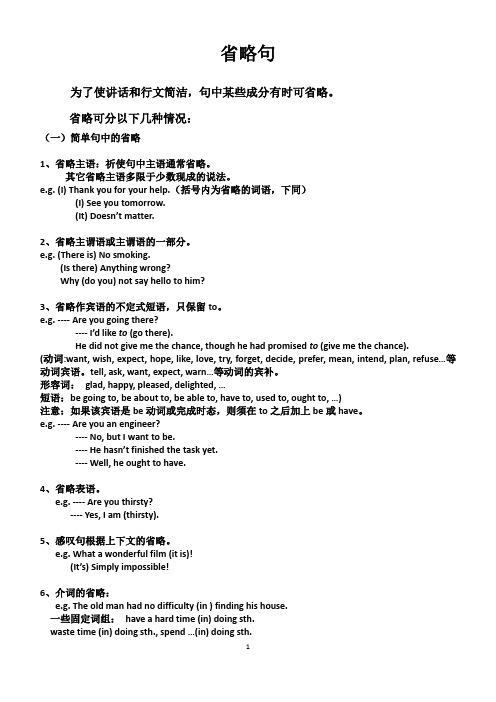
省略句为了使讲话和行文简洁,句中某些成分有时可省略。
省略可分以下几种情况:(一)简单句中的省略1、省略主语:祈使句中主语通常省略。
其它省略主语多限于少数现成的说法。
e.g. (I) Thank you for your help.(括号内为省略的词语,下同)(I) See you tomorrow.(It) Doesn’t matter.2、省略主谓语或主谓语的一部分。
e.g. (There is) No smoking.(Is there) Anything wrong?Why (do you) not say hello to him?3、省略作宾语的不定式短语,只保留to。
e.g. ---- Are you going there?---- I’d like to (go there).He did not give me the chance, though he had promised to (give me the chance).(动词:want, wish, expect, hope, like, love, try, forget, decide,prefer, mean, intend, plan, refuse…等动词宾语。
tell, ask, want, expect, warn…等动词的宾补。
形容词:glad, happy, pleased, delighted, …短语:be going to, be about to, be able to, have to, u sed to, ought to, …)注意:如果该宾语是be动词或完成时态,则须在to之后加上be或have。
e.g. ---- Are you an engineer?---- No, but I want to be.---- He hasn’t finished the task yet.---- Well, he ought to have.4、省略表语。
英语中的省略句

简单句中的省略用法A. 在对话、交际中◎在回答他人的问题时,根据问题的类型和性质,只作简短的回答。
如:(1)—Do you like playing volleyball? 你喜欢打排球吗?—Yes, I do. 是的,我喜欢。
(2)—Who is talking with our teacher? 谁在跟我们的老师谈话?—Our headmaster. 我们的校长。
(3)—What is your favourite subject? 你最喜欢哪一学科?—English. 英语。
◎谈论事物时,接着人家的话,发表自己的观点、看法,常省略相同的部分。
此时,被省略的成分可根据上文内容补出。
如:(1)—Maths is very difficult. 数学很难。
—But very important and useful. 但是很重要、很有用。
(2)—Ann is very clever. 安妮很聪明。
—And very diligent. 并且也很勤奋。
◎表达心里感受时,主语、系动词常被省略。
如:(1)—How do you find English?你认为英语怎么样?—Very interesting. 很有趣。
(2)—Nice to see you again. 又见到你真高兴。
(3)—What do you think about this film? 你认为这场电影怎样?—Very disappointing. 非常令人失望。
B. 在某些句型中◎祈使句中的主语常被省略(1) Go and open the window. 去把窗户打开。
(2) Follow me, please. 请跟我来。
(3)Be bold but don’t be shy. 胆大一点,不要害羞。
(4)Don’t worry about them. 不要为他们操心。
◎感叹句在发出感慨时,为了表达出强烈的感情,常省略主语、系动词或谓语动词等。
(完整)高中英语-省略句
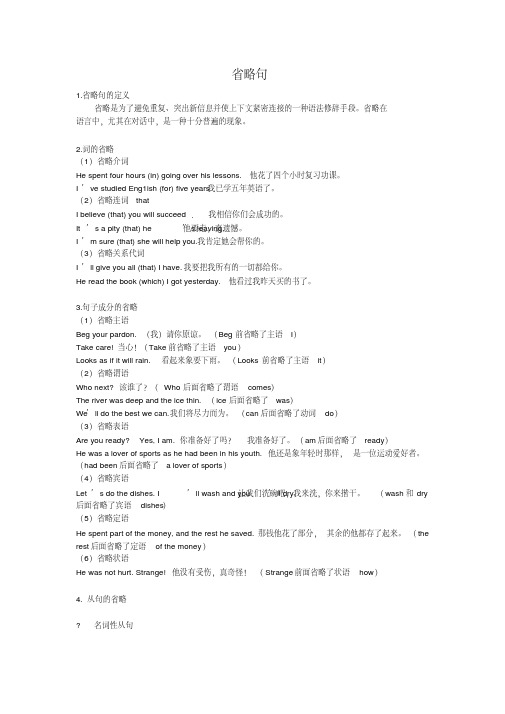
省略句1.省略句的定义省略是为了避免重复、突出新信息并使上下文紧密连接的一种语法修辞手段。
省略在语言中,尤其在对话中,是一种十分普遍的现象。
2.词的省略(1)省略介词He spent four hours (in) going over his lessons. 他花了四个小时复习功课。
I’ve studied Eng1ish (for) five years.我已学五年英语了。
(2)省略连词thatI believe (that) you will succeed.我相信你们会成功的。
It’s a pity (that) he’s leaving.他要走,真遗憾。
I’m sure (that) she will help you. 我肯定她会帮你的。
(3)省略关系代词I’ll give you all (that) I have. 我要把我所有的一切都给你。
He read the book (which) I got yesterday. 他看过我昨天买的书了。
3.句子成分的省略(1)省略主语Beg your pardon. (我)请你原谅。
(Beg前省略了主语I)Take care! 当心!(Take前省略了主语you)Looks as if it will rain. 看起来象要下雨。
(Looks前省略了主语it)(2)省略谓语Who next? 该谁了?(Who后面省略了谓语comes)The river was deep and the ice thin. (ice后面省略了was)We’ll do the best we can. 我们将尽力而为。
(can后面省略了动词do)(3)省略表语Are you ready? Yes, I am. 你准备好了吗?我准备好了。
(am后面省略了ready)He was a lover of sports as he had been in his youth. 他还是象年轻时那样,是一位运动爱好者。
英语省略句型

4.表示讲话人的意见和看法
(It) sounds fine to me. (It’s a) pity you couldn’t come.
5.提问
(Is there) anything wrong? (Have you) found the bike?
6.名词所有格修饰的名词若表示店铺,住 宅,教堂或上下文已暗示或明确指出过的 事物
--Do you think it will rain?
--I hope not (that it will not rain).
3.状语从句中的省略
1)状语从句出现在句末时,一般都可以作句尾省略。
Coming swimming?You don’t have to (coming swimming) if you don’t want to (coming swimming) .
Mary can (speak English)and Mary ought to speak English.
惯用的省略结构
1.无动词祈使句,无主句祝愿句,这类句子 往往用感叹号.
If only I could remember his name!
2.固定句型How/What about + n/pron/-ing.
What about some more milk?
3.Why not +省去to的动词不定式。
Why not go at once?
复合句中的省略
1.主句中的省略
1)主句的省略多见于句首,多用于口语中。
(It’s a) pity you couldn’t
c2o)在m对e话中答句省去整个主句只用从句。 --Shall I go to play? --If you like.(you can go to play).
高二年级英语 省略句课件

He didn词't c.ome to see us though he had promised to (come to see us).
• 10.可用不定式符号to代替重复的不定式或短语.
• Don't speak
.
没让你答话少开口。
11
Put the following into English, using ellipsis. 1 如果你愿意来我的办公室,尽管来好了。 2 你帮助我比我帮助你的多得多。 3 这种鱼你想捕多少就捕多少。 4你瞧瞧那脏水,它太难闻了! 5 A:谁要冷饮?
• 7.H状e语w从rot句e 的thi主s n语ov如el与w主hil句e (的he主w语as相) in同t,h且e c从ou句nt的ry助. • 动8.词所I是a有mb格en,o名则w词从st或a句yi人可ng接省aht略om主uys语uen,和cslhe助'os动p(h,词ooufbsfieec).e.等词, 这些
• 3.定Ro语se从s a句re中th的e f关lo系we代rs词(w如hi作ch宾) s语he, l可ike以s.省略.
• 4.关Th系is代is 词(thwehryea所so说n)明w的hy先sh行e 词wetphte. reason常加省
略.(You) Get up at once.
• •
56..祈宾I t使语hin句从k中句(th的的at主连) i语词t isythoraiugt应h常t.予可以省省略略..
Ellipsis
1
2
Classificatio • 1.词I a语m意fif思te很en明(y显ea,rs常o予ld)以.省略. n Th•e 2su.n 前shi后ne句s i中n 重th复e d出ay现tim的e,词an,d可t省he 略mo后on 面(s的hin.es) at night.
英语省略句
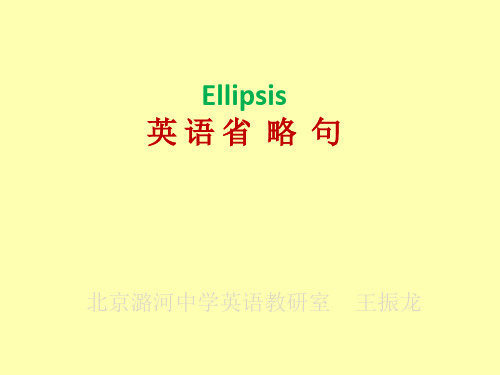
2、省略了一个从句或从句的一部分,用 so或not(切不可用it或that)代替。 e.g. ---- Is he coming back tonight? ---- I think so. ---- Is he feeling better today? ---- I’m afraid not. 这种用法常见的有:How so? Why so? Is that so? I hope so. He said so 及I suppose not. I believed not. I hope not 等。(但I don’t think so.比I think not.更 常用)。
3、省略作宾语的不定式短语,只保留to。 e.g. ---- Are you going there? ---- I’d like to (go there). He did not give me the chance, though he had promised to (give me the chance). 注意:如果该宾语是be动词或完成 时态,则须在to之后加上be或have。 e.g. ---- Are you an engineer? ---- No, but I want to be. ---- He hasn’t finished the task yet. ---- Well, he ought to have.
3、在某些状语从句中,从句的主语与主 句主语一致时,可省去“主语 + be”部 分。(参看“状语从句”有关部分)
4、连词if在部分虚拟条件句中可省略, 但后面的语序有变化.(参见“倒装句” 有关部分)
5、主句与从句各有一些成分省略。 e.g. The sooner (you do it), the better (it will be).
省略句祈使句

特殊句式省略句在英语中,有时为了避免结构上或内容上的重复,并使上下文紧密连接;有时因为语法的客观要求,句子中的一个或几个成分不需要表达出来,这种现象称为省略。
一、简单句中的省略1. 省略主语。
Haven't seen you for ages!2.省略谓语。
Anything you want?3. 省略宾语。
—Where is he?—I don't know.二、并列句中的省略在并列句中,如果后面的分句,与前面的分句有相同的部分,这一部分则常被省略掉,以免重复。
He teaches English and his brother maths.三、复合句中的省略1. 在含有状语从句的复合句中,当从句和主句的主语一致或从句的主语为it且从句中有be动词时,可以省略从句中的主语和be动词。
When (she was) asked, she didn't answer a word.As (he was) a young man, he studied law and became a lawyer.If (it is) so, you must go back and get it.【疑难点击】当先行词是time, reason, place等时,作状语的关系副词when, where, why等也可以省略。
The reason (why) he did that is quite clear.3. 名词性从句中的省略(1)宾语从句中的第一个that可省略。
He said he had arrived here two days before and that he had lived in a hotel.(2)宾语从句中I'm afraid, I think, I believe, I hope, I guess等作答语,后面so 与not分别等于肯定和否定,宾语从句可省略。
- 1、下载文档前请自行甄别文档内容的完整性,平台不提供额外的编辑、内容补充、找答案等附加服务。
- 2、"仅部分预览"的文档,不可在线预览部分如存在完整性等问题,可反馈申请退款(可完整预览的文档不适用该条件!)。
- 3、如文档侵犯您的权益,请联系客服反馈,我们会尽快为您处理(人工客服工作时间:9:00-18:30)。
1)省略动词 + 宾语或补语 •I will buy a house. He will (buy a house) too. •John was the winner in1994, and Bob (was the winner) in 1995. 2)省略主语 + 谓语动词
在下列词后常省略不定式 但要保 留 ‘to’: want wish like hate hope intend plan love refuse expect
当want 和like用于从句中时,to 常常省略。
•Come when you want. •I have decided to do what I like.
复合句的省略现象多出现在状 语从句中
•Although hard-working, he couldn’t earn enough even to support him
•When still a boy of six, Bob was sent away from home. •If necessary, I’ll pay him a personal visit.
高考英语课件省略句
1.简单句中的省略现象 1)句首省略
省略了句子的主语,有时还连 同谓语动词一起省略
•Sounds like a good idea. •Pity we live so far from the sea. •Beautiful day, isn’t it?
Wonder what she is doing. Forgotten my name? Nobody at home. 2)答语的省略
The train is going (at) fifty miles an hour.
This is the most exciting game (that) I have ever watched.
4)不定式的省略 •I went there because I want to.
---will you join us? ---Yes I’d love to.
George will (take the course) and bob might take the course.
3.复合句中的省略现象
复合句中的省略现象常见have a good journey. •Too bad she won’t be able to go to the party.
•While cooking dinner, she thought of her past.
•He advised me not to say anything until asked.
引导宾语从句的从属连词只要 从句不长,通常都可省略。
I hope (that) all will go well.
• They tried to prevent the pollution, but (they did) not (prevent pollution) very successfully at the beginning.
并列句的省略有时还可出现在 前面的分句中,这时被省略的 词语便出现在下文。
有时整个主句都可省略, 这种 省,略通 出现在简短答中。
---are you going to buy the house? ---Unless my wife objects.
---You all like the story? ---yes, except that the end is
too surprising.
---Have you finished your composition?
---Not yet.
---will you join us? ---I should love to. •Linda has arrived. ---when? •He won’t go to the party.---why not?
We still have shortcomings, and (we have) very big ones, too.
出现在并列句中的be,have,do,如 果在一个分句中作助动词,而 在另一个分句中作行为动词, 不可省略
•The man has a gun and has threatened to use it.
在某些动词后可省略‘to’如: try, 尤其是在adj.后。
---Can you start the car? ---Ok, I will try.
•You can’t force him to get a job if he is not ready (to).
2.并列句中的省略现象
在后一并列分句中凡是与上下 文相同的成分通常都要省略
在than或as引起的从句中的省略
•Many others are doing better than we are. •He works harder than ever. •Jane is as tall as I. •They will try to put the plan into practice as quickly as possible.
3)结构省略 这种省略可以根据通常的语法 结构加以判断
We have lived here (for) ten years.
在否定句中不可省略 I haven’t seen you for three months.
Some other examples: •You will never manage successfully (in) that way.
•Mary did the work but did not finish it.
3) 省略主语 + 谓语 + 宾语 •They have increased trade with China and (they have increased trade) with other East-Asian countries, too.
Be careful that you don’t catch cold.
但如果从句较长或从句的语境 较复杂, 连词that 不能省略
•She has made it clear that she will have nothing to do with him. •Everybody could see what an important person he was, and that they ought to be careful not to offend him.
